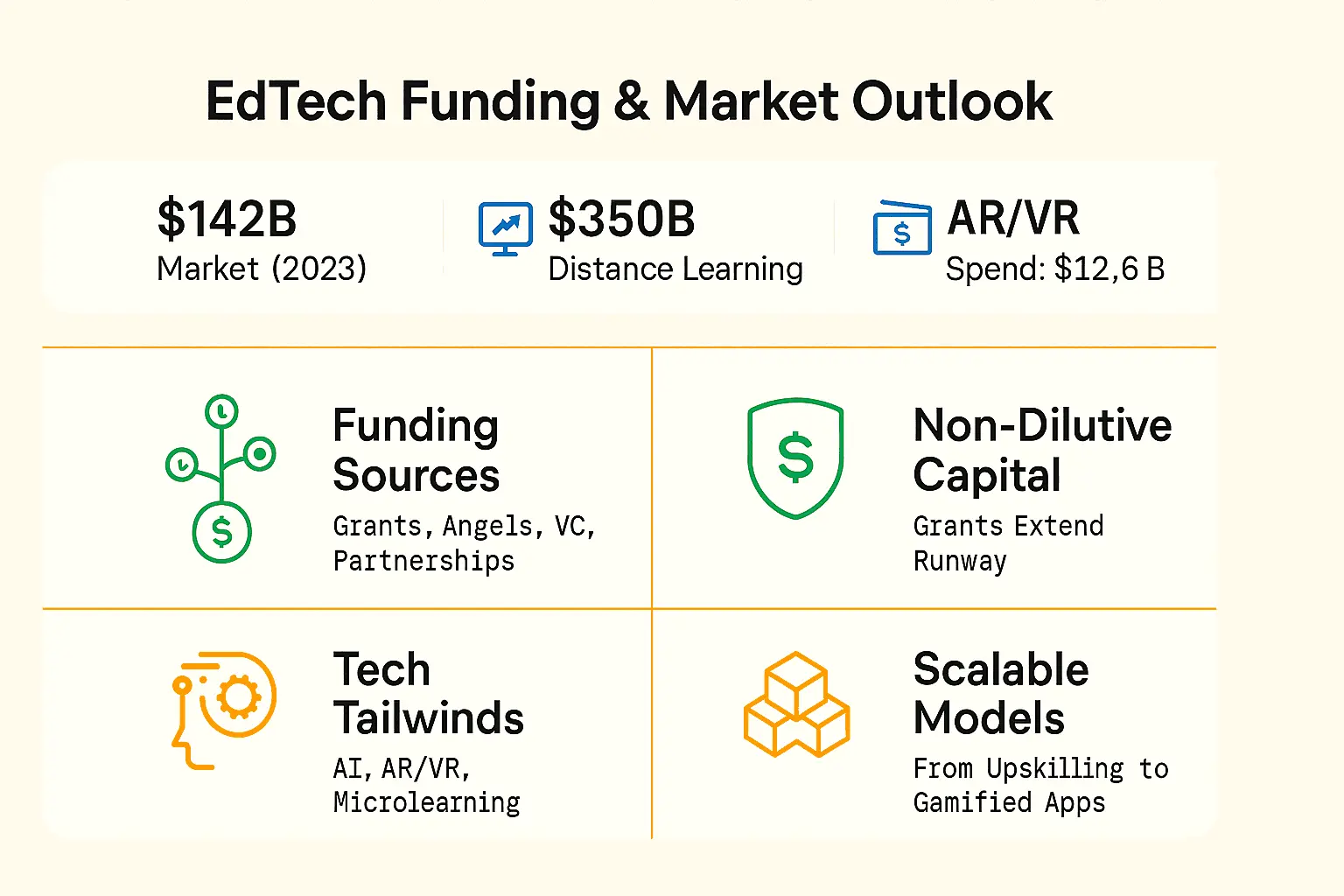The EdTech industry is evolving at an unprecedented pace, driven by innovation and rising demand for accessible learning solutions. Global EdTech-focused startups have already secured around $2.8 billion in funding across all stages, signaling both strong opportunity and growing investor confidence. For founders, that translates into greater access to capital, along with fiercer competition.
This blog brings those threads together. It aims to guide EdTech founders through the diverse funding strategies, resources, and signals that matter so they can navigate the market with more clarity—and a better shot at actually closing the round.
EdTech Funding Sources & Market Overview
The global EdTech market is a dynamic force in education. Its valuation was $142.37 billion in 2023. The top EdTech funding sources include grants, angel investors, venture capital firms, and strategic partnerships. Early-stage startups benefit from targeting sector-specific funds and blended finance models.
Looking ahead, distance learning products are projected to reach a $350 billion valuation. This projection demonstrates continued momentum for digital education as remote and hybrid models rapidly gain adoption. Investors and startups should strategize for long-term, technology-driven expansion as virtual delivery reshapes learning.

The Strategic Role of Non-Dilutive Funding in EdTech
Building on this growth, non-dilutive funding plays a crucial role for EdTech startups. Government grants, innovation prizes, and fellowships can support research, product development, and early pilots without requiring founders to give up equity. Used well, these sources extend runway, de-risk experimentation, and help teams reach key milestones before or alongside traditional venture capital.
Technology Tailwinds and Market Leaders
Technological advances are reshaping the market’s growth profile. Spending on augmented and virtual reality is expected to rise from $1.6 billion to $12.6 billion, as immersive tools drive engagement, retention, and differentiated learning experiences. In parallel, AI integration and microlearning strategies are helping close skill gaps and personalise learning at scale.
Key players illustrate how diverse and scalable EdTech models can be:
- General Assembly focuses on upskilling professionals and career transitions.
- Duolingo uses gamification to transform language learning.
- Udemy offers a broad marketplace of courses for personal and professional development.
These examples show that well-positioned EdTech companies can adapt across learner types, price points, and distribution models, one reason the sector continues to attract attention despite funding headwinds.
Your perspective on the EdTech funding landscape is broadened by the detailed overview in how to raise funds for edtech startups, which situates the challenges and opportunities within a wider market context.
Investor Selection & Outreach: Strategies for Engaging Investors
Effective outreach to EdTech funding sources starts with a focused, credible pitch deck and targeted communication. Founders should tailor messages to each investor’s thesis, sector focus, ticket size, geography, and preferred stage. This level of personalization shows you understand their priorities and immediately increases the odds of a serious conversation.
Articulating Your Unique Value Proposition and Defensible Advantages
Beyond tailored outreach, you need a sharp narrative about why your startup wins. Clearly articulate:
- Your unique value proposition (who you serve, what problem you solve, and why it’s urgent).
- Your defensible advantages, proprietary technology, exclusive partnerships, data moats, or patents that competitors can’t easily copy.
Investors want concrete reasons to believe you can outperform rivals and sustain growth over time. A clear, specific story here is often the difference between “interesting” and “send the deck”.
As you engage, watch for signs of investor mismatch or hesitation, vague feedback, lack of EdTech or regulatory understanding, or confusion around your model. These are signals to reassess whether they’re the right partner rather than chasing lukewarm interest.
Showing a Credible Path to Scale
Finally, investors expect a well-defined growth plan: how you’ll acquire customers, expand into new markets, hit revenue milestones, and use the capital you’re asking for.
Including a clear view of your cap table and future hiring and fundraising plans helps build trust. A cap table calculator can help you map out equity ownership and show investors a transparent, thought-through structure—before they even ask the awkward dilution questions.
For startups seeking innovative funding models, exploring blended finance edtech partnerships can provide insights into combining public and private investments to fuel growth.
EdTech Venture Capital Firms: Evaluating Strategic Investments
Venture capital firms specializing in EdTech are reshaping how they evaluate opportunities. Leading investors such as Owl Ventures and Reach Capital are moving beyond pure growth metrics to focus on measurable learning outcomes, backing solutions that deliver tangible benefits for students, teachers, and institutions. Scalability and innovation still matter, but outcomes and impact increasingly sit at the centre of the investment thesis.
Firms like Owl Ventures prioritize startups that combine market scale with innovative learning models. AI-based tools, microlearning platforms, and data-driven products are gaining traction because they offer personalised learning experiences and measurable improvements in engagement and performance. Founders who can clearly show these outcomes in their pitch stand out quickly in a crowded dealflow.
Navigating Regulatory Compliance and Institutional Sales Cycles
Meeting these investment criteria also means being realistic about regulation and go-to-market. EdTech products must comply with standards such as GDPR and FERPA, protect sensitive learner data, and meet accessibility requirements. On the commercial side, institutional buyers often require pilots, stakeholder buy-in, and lengthy procurement processes, factors that can extend sales cycles and delay revenue.
Startups that proactively manage these risks, plan for long sales timelines, and build compliance into their product from day one tend to inspire far more investor confidence and support sustainable growth.
A prime example of strategic EdTech investing is Eruditus, which secured a major Series F round through partnerships with prominent global investors. The deal shows how aligning with outcomes-focused, sector-savvy VCs can unlock significant late-stage capital.
For founders seeking funding, understanding what EdTech VCs actually value, measurable impact, scalability, and regulatory readiness, can make the difference between a pass and a term sheet. Legal and compliance considerations are explored in more detail in “legal aspects of EdTech startup fundraising,” which outlines the key constraints shaping deals in this sector.
Across the market, EdTech companies are averaging around 8.1x revenue multiples in 2025, supporting higher valuations for innovative, scalable startups and justifying continued targeted VC focus on the category.
Top Education Pre-Seed Investors: Early-Stage Opportunities in EdTech
Pre-seed EdTech funding sources include grants, angel investors, specialist EdTech funds, early-stage venture firms, and accelerators.
Grant opportunities provide vital pre-seed support for founders. For example, the Mastercard Foundation EdTech Startup Fellowship in Ghana awards $60,000 equity-free grants, helping startups build and validate solutions before raising venture rounds.
Over the last decade, “education investor” has gone from niche to a serious asset class. Platforms like NFX’s Signal now track 1,000+ education pre-seed investors globally, including names such as Precursor Ventures, General Catalyst, and NextView, who actively write first cheques into learning startups. Across the broader ecosystem, 1,071 early-stage investors have been identified as actively backing EdTech ventures, showing just how deep the global pre-seed pool has become.
On top of generalist investors, there’s a growing layer of specialist EdTech funds whose entire thesis is “learning + work” at pre-seed and seed, such as:
- Emerge Education (Emerge Capital) – a dedicated ~$73M pre-seed fund backed by 100+ “future of work and learning” operators, positioning itself explicitly as first money in for work and learning founders.
- Reach Capital – one of the most active early-stage EdTech investors globally, backing learning, health, and work products from seed to Series B across K–12, higher education, and workforce.
- Brighteye Ventures – Europe’s first and largest EdTech-focused VC, managing a ~€100M fund to support founders from pre-seed to Series A.
Investor databases and market overviews of 30–50+ active EdTech VCs show that many of these funds are happy to start at pre-seed and seed, typically writing cheques from roughly $100k to low single-digit millions, often with strong follow-on capacity.
Alongside pure-play VCs, specialised EdTech accelerators such as WGU Labs’ EdTech Accelerator and the WISE Edtech Accelerator work specifically with pre-seed companies, combining smaller tickets with research support, go-to-market help, and distribution access.
The diversity of EdTech funding makes it essential to identify niche areas that resonate with specific investor priorities, whether that’s gamified learning, AI-driven tutoring, or accessibility-focused platforms.
Put simply: there is now a real, global pre-seed capital stack for education. If you’re building AI-native learning tools, skills and workforce upskilling products, assessment solutions, or access/affordability platforms for underserved learners, you’re no longer “too early”, you’re exactly the stage these funds and accelerators were built for.
Edtech Grants Case Study
Eneza Education expanded to 6 million learners across Africa with over $2 million in grants and funding, leveraging tools like Grand Challenges for Education Innovation grants up to $100,000 for crisis contexts. Duolingo utilized grants to launch Duolingo ABC, a literacy app downloaded over 10 million times in low-resource areas, demonstrating non-dilutive funding's role in product validation.
Chan Zuckerberg Initiative grants, ranging $50,000-$500,000, supported learning engineering tools, while Edtech Evidence Exchange offered up to $50,000 for product evaluations
Edtech Angel Investors Funding Example
Edsoma, an AI reading assistant, raised $2.5 million in seed led by Shaquille O’Neal, highlighting celebrity angels' impact on early traction. Naval Ravikant backed Teachable and Udemy via AngelList, fueling online course platforms' growth through networks connecting founders to talent. Esther Dyson invested in Duolingo, Edmodo, and 2U, emphasizing edtech's potential for efficiency and creativity in social learning.
Edtech VC Funding Success
Unacademy's valuation hit $1.45 billion after a $150 million round led by SoftBank Vision Fund 2, with Facebook and Sequoia, tripling from $510 million amid pandemic demand. Loora secured $21.25 million for AI English coaching, while MagicSchool and LeapScholar captured major 2025 VC shares for AI teacher aids and study abroad tools. Early-stage resilience persists, with over 300 edtechs funded despite market drops, prioritizing B2B scalability and AI integration.
Conclusion
EdTech isn’t short of money, it’s short of sharp, fundable stories. Capital is available at every stage: grants, angels, pre-seed funds, specialist VCs, and accelerators have built a real global stack for learning startups. But the bar has moved. Investors now expect clear learning outcomes, regulatory readiness, and a credible plan to survive long sales cycles with schools, universities, and enterprises.
Non-dilutive funding is no longer a “nice bonus”; it’s a strategic weapon to extend runway, prove impact, and enter VC conversations from a position of strength. If you can show real outcomes, a defensible edge, and a clean path to scale, not just “edgy” tech, you’re not too early for this market. You’re exactly what it’s hunting for.
If your raise needs to unite learning efficacy, unit economics (the profit to loss ratio of each product sold) , and district procurement into one bankable case, move forward with our education technology fundraising assistance. Set up a funding gameplan session!
Key Takeaways
- EdTech is a fast-growing market, with valuations in the hundreds of billions and billions in startup funding already deployed.
- Non-dilutive capital (grants, fellowships, prizes) is a strategic runway extender, not a side quest, especially in early stages.
- AI, AR/VR, and microlearning are the core tech tailwinds driving engagement, outcomes, and investor interest.
- Winning pitches combine a sharp value proposition with clear defensible advantages, data, IP, partnerships, or product depth.
- EdTech VCs now optimise for measurable learning outcomes, regulatory readiness, and realistic institutional sales cycles.
- There’s a real global pre-seed stack: angels, specialist EdTech funds, and accelerators actively writing first cheques.
- Case studies like Eneza, Duolingo, Unacademy, and Loora prove that smart use of grants + VC can scale impactful EdTech globally.
Frequently asked Questions
How can EdTech startups attract pre-seed investors?
EdTech startups can attract pre-seed investors by showcasing a clear market need, scalable solutions, and tailored pitches focusing on investor criteria.






